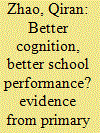|
|
|
Sort Order |
|
|
|
Items / Page
|
|
|
|
|
|
|
| Srl | Item |
| 1 |
ID:
168352


|
|
|
|
|
| Summary/Abstract |
Although students in rural and migrant schools in China generally have not performed well, a share of each cohort has been able to thrive in school and to test into academic high school and college. To understand the origins of persistence, specifically, why some students learn more than do others, researchers have identified certain sources of the problem. Few studies, however, have paid attention to the role that low levels of cognitive development of students play in their academic performance. To address this gap, this study focuses on the role that cognition may play in terms of the academic achievement of rural students. We analyze data from more than 10,000 primary school students from private migrant schools in Beijing and Suzhou and from public rural schools in Henan and Anhui, using the Raven Standard Progressive Matrices test. Our results show high rates of developmental delay (about 33% of the students have Ravens scores that are less than one standard deviation lower than an international mean). Further, the rates of delay are large among all subgroups in the study, including rural children who attend migrant schools in cities and those who live in rural areas and attend rural public schools. The results also suggest that the cognition of students is highly correlated with their educational performance and, in fact, is by far the most important factor in their academic achievement.
|
|
|
|
|
|
|
|
|
|
|
|
|
|
|
|
| 2 |
ID:
136230


|
|
|
|
|
| Summary/Abstract |
A substantial proportion of China's rapid economic growth is attributed to its large number of rural to urban migrants, but most of these migrants' children are left behind in rural areas, mainly due to China's household registration system. Any attempt to identify the impact of parental migration on children's school performance may encounter the problem of endogeneity. We use unique survey data from more than 7600 4th and 5th grade students from 74 rural elementary schools. Using an instrumental variable estimation, our results indicated that having migrant parents can marginally reduce a child's math score rank by 15.60%, which implies that the current economic growth in China partially jeopardizes the future of the next rural generation. Based on a bivariate probit model, the results show that compared to neither parents being migrants, migration of the father reduces the rank of a child's math score by 8.37%, and migration of the mother reduces the rank by 23.30%.
|
|
|
|
|
|
|
|
|
|
|
|
|
|
|
|
|
|
|
|
|